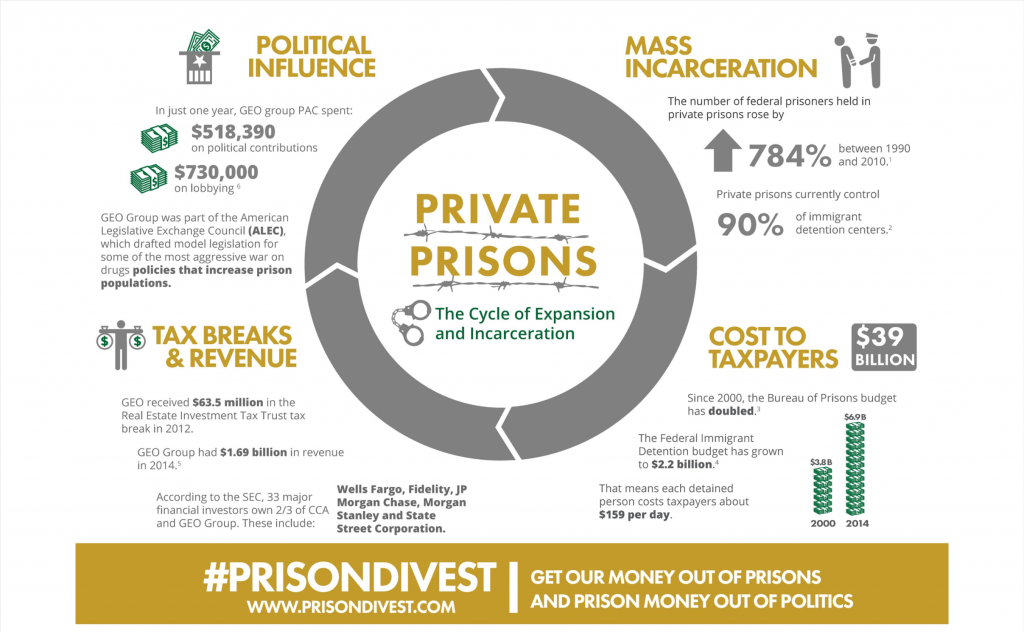The US government contracts with several third-party corporations to manage correctional facilities. Jails, prisons, and detention centers run by these corporations are referred to as “private prisons.” Two corporations, GEO Group, Inc. and CoreCivic, Inc. (CCA), manage over half of the private prison contracts in the US. These contracts are extremely lucrative; in the 2017 fiscal year, GEO Group and CoreCivic earned a combined revenue of more than 4 billion dollars. Corporations like GEO Group and CoreCivic are invested in mass incarceration because incarceration is profitable for them. Such corporations ensure that correctional facilities are in demand through a variety of techniques, including minimum occupancy clauses and political lobbying efforts.
Roughly three-quarters of private prison contracts include minimum occupancy clauses (also known as “bed guarantees”) which “…state that the government contracting with a prison must maintain a specific percentage of occupancy at that prison” (American University Business Law Review). A study of private prison contracts by the Brennan Center for Justice found that “…the majority of these contracts guarantee that the state will supply enough prisoners to keep between 80 and 100 percent of the private prisons’ beds filled. If the state fails to fulfill this ‘bed guarantee’, it must pay a fine to the company running the prisons – in effect, paying for each prison bed regardless of whether it holds a prisoner.” Because governments are financially penalized when they do not meet or exceed the minimum occupancy requirements, governments are incentivized to arrest and incarcerate more and more people. By incorporating minimum occupancy clauses, private prison corporations reinforce mass incarceration through their contracts with governments.
In addition to contract clauses that further mass incarceration, private prison corporations also engage in lobbying efforts and campaign funding in order to sway policies and politicians and uphold mass incarceration. In its 2014 report, CoreCivic stated that, “the demand for our facilities and services could be adversely affected by the relaxation of enforcement efforts, leniency in conviction or parole standards and sentencing practices or through the decriminalization of certain activities that are currently proscribed by our criminal laws” (The Washington Post, 2015). Because the profitability of private prisons is contingent on these policies and practices, private prison corporations are heavily involved in political lobbying as they seek to maintain and strengthen carceral policies. CoreCivic and GEO Group “….have spent millions of dollars on lobbying and campaign contributions, seeking to sway the political process toward detention-focused policies that favor their interests” (Migration Policy Institute). Much of their money and lobbying efforts center on immigration-related policies. For example, an investigation by Grassroots Leadership found that “CoreCivic spent $10.6 million on immigration-related lobbying between 2008 and 2014…of this total, $9,760,000 went toward directly lobbying members of the House Appropriations Committee Homeland Security Subcommittee, which is responsible for funding immigration detention.” The focus on immigration makes sense because the majority of immigration detention facilities are private: 73% of people in immigration detention were held in privately owned facilities in 2017 whereas only 8.5% of people incarcerated at the state and federal level were held in private facilities in 2016 (The Sentencing Project). CoreCivic’s immigration-related lobbying is thus a strong example of how private prisons strive to influence policies and politicians in order to continue the cycle of mass incarceration and increase their profit. The effects of such lobbying efforts undertaken by private prison corporations are not limited to the private prison industry but rather reverberate throughout the PIC and society at large. For example, increasingly stringent immigration laws not only fill detention centers but also can negatively contribute to public perception of immigrants and can lead to heightened discrimination.

The US maintains the world’s largest private prison population, and the number of people held in private facilities is rapidly increasing: “since 2000, the number of people in private prisons has increased 39.3%, compared to an overall rise in the prison population of 7.8%” (The Sentencing Project). However, currently only 8.5% of people who are incarcerated are held in private facilities. Despite the significant amount of economic and political power held by private prison corporations, it is imperative to understand that private prisons are not the only force at work in the Prison Industrial Complex. Exclusive focus on private prison corporations as the lynchpin of the PIC ignores and overlooks the variety of other players and systems at work. For example, there are thousands of companies and a wide range of contracts in both private and public prisons: it is a whole network of parties with vested interests. In Are Prisons Obsolete, Angela Davis explains that, “…even if private prison companies were prohibited – an unlikely prospect, indeed-the prison industrial complex and its many strategies for profit would remain relatively intact. Private prisons are direct sources of profit for the companies that run them, but public prisons have become so thoroughly saturated with the profit-producing products and services of private corporations that the distinction is not as meaningful as one might suspect” (Davis, 2003, 99-100).
There is a staggeringly high number of corporations involved in the PIC. A 2020 report by Worth Rises identifies and “…exposes over 4,100 corporations that profit from the devastating mass incarceration of our nation’s marginalized communities.” These corporations — “focused on their bottom line, advantaged by an obscure environment, and often empowered by monopolistic contracts,” — are often relatively unregulated and thus are able to engage in exploitative practices. (Worth Rises) For example, many corporations that provide services within correctional facilities grossly overcharge: “companies like Securus and Keefe charge as much as $25 for a simple 15-minute phone call and $6 for mere $20 deposit, respectively” (Worth Rises).
Contracts for supplies and services can be just as lucrative as private prison management contracts. For example, “when VitaPro Foods of Montreal, Canada, contracted to supply inmates in the state of Texas with its soy-based meat substitute, the contract was worth $34 million a year” (Davis, 2003, 99). Just like private prison contractors, companies that contract with public prisons to provide goods and services are equally invested in mass incarceration. Nils Christie explains, “…companies that service the criminal system need sufficient quantities of raw materials to guarantee long-term growth . . . In the criminal justice field, the raw material is prisoners and industry will do what is necessary to guarantee a steady supply. For the supply of prisoners to grow, criminal justice policies must ensure a sufficient number of incarcerated Americans regardless of whether crime is rising or the incarceration is necessary” (Davis, 2003, 94).
